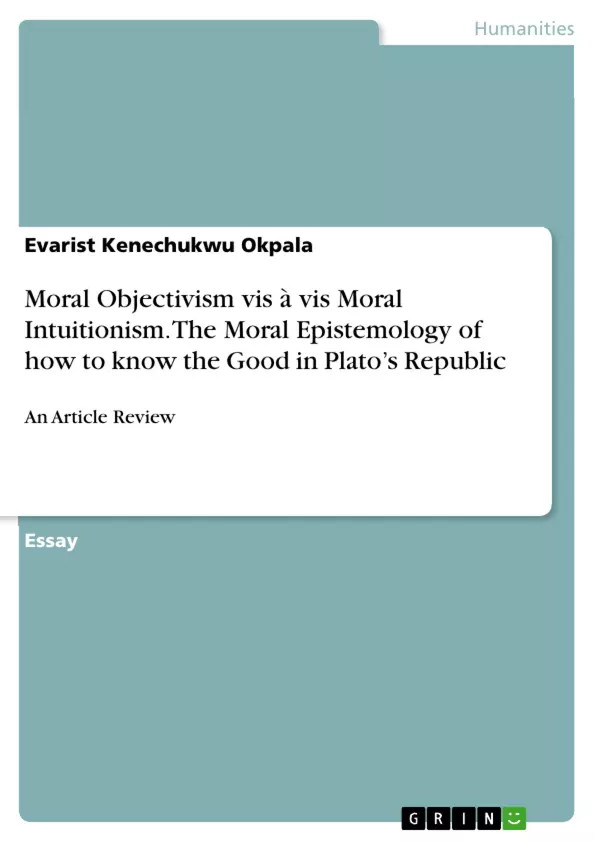There is no doubt that Plato’s classical conception of what constitutes a real and indubitable knowledge has to be something static, for what fluctuates cannot satisfactorily be a source of knowledge. With his classical doctrine of the two worlds, the world of Forms and the world of appearance (the changing world), he demonstrates how the ability to rise above the changing world to the world of Forms or ideas gives a guarantee for certainty in knowledge.
Here, we are interrogating the knowledge of the Good, which of course, following Plato’s classical two worlds doctrine, there is an objective Good which transcends the changing world of appearances, and whose knowledge is achievable (the knowledge of the Good in itself). That is to say that, there exists a great doze of objectivity in moral pursuits, meaning that what passes as a morally good action cannot be relative, for the Good in itself objectively exists. The task then becomes how this Good which exists, and how this Good that is the principle of objective moral acts (moral objectivism) could be reached. In other words, how could it be known.
The article under review presents as well as interrogates intuition (moral intuitionism) as the faculty that seems to make it possible for moral objective principles to be arrived at. (that is to say, because the Good exists outside the visible boundaries of the physical world of physics and other sciences, it could only be arrived at through intuition). In other words, this article under review tries to find out how plausible it is in the first place to argue for moral objectivism, and how rational it is to conclude that if moral objectivism is plausible enough and that there exist objective moral principles, that intuition seems to be the way that leads to their knowledge as well as the Good. The article checks to know if the knowledge of the Good is as objective as Plato claims it is and whether intuition through which the Good could be reached (as the article claims) is as objective and as reliable as other sources of knowledge like the sciences.
Table of Contents
- Abstract
- Moral Objectivism in Doubt
- Plato and Moral Intuitionism
- The Good and its Knowledge
- Evaluation and Conclusion
Objectives and Key Themes
This article reviews J. Gentzler's "How to know the Good: The Moral Epistemology of Plato's Republic," examining whether Plato's argument for moral objectivism relies on moral intuitionism. The author investigates the plausibility of moral objectivism and the role of intuition in achieving knowledge of the Good.
- Moral Objectivism in Plato's Republic
- The Role of Intuition in Moral Epistemology
- The Nature of the Good and its Knowability
- Comparison of Inductive/Deductive Reasoning with Intuition
- Critique of Gentzler's Argument
Chapter Summaries
The Abstract introduces the article's central question: how Plato's concept of an objective Good can be known. Moral Objectivism in Doubt questions the objectivity of moral principles by comparing them to the more easily defined ends of crafts like medicine. Plato and Moral Intuitionism explores Plato's apparent reliance on intuition in the *Phaedrus* and contrasts it with the more reasoned approach in the *Republic*. The Good and its Knowledge analyzes Plato's method for understanding the Good, examining the use of inductive and deductive reasoning and whether this contradicts the idea of direct intuitive apprehension. The Evaluation and Conclusion section is omitted to avoid spoilers.
Keywords
Plato, Republic, moral objectivism, moral intuitionism, the Good, epistemology, inductive reasoning, deductive reasoning, Forms, justice.
- Quote paper
- Evarist Kenechukwu Okpala (Author), 2024, Moral Objectivism vis à vis Moral Intuitionism. The Moral Epistemology of how to know the Good in Plato’s Republic, Munich, GRIN Verlag, https://www.grin.com/document/1514638



